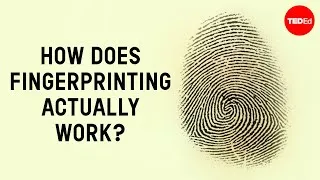请双击下面的英文字幕来播放视频。
00:00
Translator: Timothy Covell
Reviewer: Morton Bast
0
0
7000
翻译人员: Zhixue Su
校对人员: Zhenwei Huang
00:15
So it turns out that mathematics is a very powerful language.
1
15260
3671
数学是一门很有用的语言。
00:18
It has generated considerable insight in physics,
2
18931
2312
在解释物理、生物以及经济学方面,
00:21
in biology and economics,
3
21243
2100
它拥有与生俱来的洞察力,
00:23
but not that much in the humanities and in history.
4
23343
2817
但对于历史等人文学科解释力稍弱。
00:26
I think there's a belief that it's just impossible,
5
26160
2283
我想有人认为用数学解释人文学科是不可能的,
00:28
that you cannot quantify the doings of mankind,
6
28443
2646
因为你不能量化人类的行为,
00:31
that you cannot measure history.
7
31089
2519
你也不能用数学来度量历史。
00:33
But I don't think that's right.
8
33608
1527
但我并不这样认为,
00:35
I want to show you a couple of examples why.
9
35135
2042
我想向大家展示几个反例。
00:37
So my collaborator Erez and I were considering the following fact:
10
37177
2958
我和我的合作伙伴Erez考虑了以下事实:
00:40
that two kings separated by centuries
11
40135
2729
这个事实就是身处不同时代的君王
00:42
will speak a very different language.
12
42864
1767
会用非常不同的语言交谈。
00:44
That's a powerful historical force.
13
44631
2304
这是一股非常强大的历史作用力。
00:46
So the king of England, Alfred the Great,
14
46935
1773
因此英国国王阿尔弗雷德大帝,
00:48
will use a vocabulary and grammar
15
48708
1640
将会使用一种语法和词汇,
00:50
that is quite different from the king of hip hop, Jay-Z.
16
50348
3700
而这种语法和词汇是完全不同于hip hop之王Jay-Z所使用的。
00:54
(Laughter)
17
54048
1666
(笑声)
00:55
Now it's just the way it is.
18
55714
2171
这就是我想说的事实。
00:57
Language changes over time, and it's a powerful force.
19
57885
2292
语言与时俱进,并且拥有强大的力量。
01:00
So Erez and I wanted to know more about that.
20
60177
2287
因此我和Erez想了解更多有关语言的历史。
01:02
So we paid attention to a particular grammatical rule, past-tense conjugation.
21
62464
3657
我们研究了一个特定的语法规则:过去式。
01:06
So you just add "ed" to a verb at the end to signify the past.
22
66121
3264
人们通过在动词后面加“ed”来表示过去。
01:09
"Today I walk. Yesterday I walked."
23
69385
1927
例如:“Today I walk.”今天我走路,
“Yesterday I walked.”昨天我走路。
01:11
But some verbs are irregular.
24
71312
1344
但有一些动词的变形是不规则的。
01:12
"Yesterday I thought."
25
72656
1396
例如:“Yesterday I thought.”昨天我思考了。
01:14
Now what's interesting about that
26
74052
1666
这里有趣的现象是:
01:15
is irregular verbs between Alfred and Jay-Z have become more regular.
27
75718
3830
从阿尔弗雷德大帝到Jay-Z时代,不规则动词变的越来越规则了。
01:19
Like the verb "to wed" that you see here has become regular.
28
79548
2735
例如你们这里看到的动词“to wed”就变成了规则动词。
01:22
So Erez and I followed the fate of over 100 irregular verbs
29
82283
4022
因此我和Erez跟踪了100个不规则动词
01:26
through 12 centuries of English language,
30
86305
1919
在12个世纪的英语演化中的命运,
01:28
and we saw that there's actually a very simple mathematical pattern
31
88224
2911
我们发现了一个非常简单的数学规律
01:31
that captures this complex historical change,
32
91135
2542
来捕捉复杂的历史变化,
01:33
namely, if a verb is 100 times more frequent than another,
33
93677
3660
这个规律就是,如果一个动词比另一个动词的使用频率高一百倍,
01:37
it regularizes 10 times slower.
34
97337
2665
这个动词规则化的速度就会慢十倍。
01:40
That's a piece of history, but it comes in a mathematical wrapping.
35
100002
3935
这是历史的一部分,但却以数学的方式得以展现。
01:43
Now in some cases math can even help explain,
36
103937
3654
在某些情况下,数学甚至可以帮助解释,
01:47
or propose explanations for, historical forces.
37
107591
2879
或者对历史的推动力加以解释。
01:50
So here Steve Pinker and I
38
110470
1832
我和Steve Pinker
01:52
were considering the magnitude of wars during the last two centuries.
39
112302
3852
考虑了过去两个世纪中战争的激烈程度。
01:56
There's actually a well-known regularity to them
40
116154
2495
事实上有一条广为人知的规律:
01:58
where the number of wars that are 100 times deadlier
41
118649
3422
造成一百倍伤亡人数的战争数目
02:02
is 10 times smaller.
42
122071
1952
只占更少伤亡人数的战争数目的十分之一。
02:04
So there are 30 wars that are about as deadly as the Six Days War,
43
124023
3344
有30场战争的伤亡人数与“六日战争”(第三次阿以战争)的几乎持平,
02:07
but there's only four wars that are 100 times deadlier --
44
127367
2820
但只有4场战争比“六日战争”的伤亡人数高出一百倍,
02:10
like World War I.
45
130187
1977
例如第一次世界大战。
02:12
So what kind of historical mechanism can produce that?
46
132164
2923
那么这背后的历史原因是什么呢?
02:15
What's the origin of this?
47
135087
2000
什么是这条规律的原因呢?
02:17
So Steve and I, through mathematical analysis,
48
137087
2265
我和Steve通过数学分析,
02:19
propose that there's actually a very simple phenomenon at the root of this,
49
139352
4241
认为这是由一个非常简单的现象导致的,
02:23
which lies in our brains.
50
143593
1690
而这个现象植根于我们的意识之中。
02:25
This is a very well-known feature
51
145283
2019
这是一个众所周知的特征,
02:27
in which we perceive quantities in relative ways --
52
147302
2975
人们对数量的感觉是相对的,
02:30
quantities like the intensity of light or the loudness of a sound.
53
150277
3716
诸如光源的强弱或者声音的大小。
02:33
For instance, committing 10,000 soldiers to the next battle sounds like a lot.
54
153993
5309
下面有个例子,派遣10000名士兵去参加下一场战斗乍一听是很多人。
02:39
It's relatively enormous if you've already committed 1,000 soldiers previously.
55
159302
3444
特别是如果你之前只派遣了1000名士兵去参战的话,这个数字就更显得庞大了。
02:42
But it doesn't sound so much,
56
162746
1827
但同样的数字也会显得不那么多,
02:44
it's not relatively enough, it won't make a difference
57
164573
3020
当它还不足以造成巨大的差别的时候,
02:47
if you've already committed 100,000 soldiers previously.
58
167593
2952
假如你之前已经派遣了100000名士兵参加战斗。
02:50
So you see that because of the way we perceive quantities,
59
170545
3613
因此你们会看到由于我们对数字的感觉是相对的,
02:54
as the war drags on,
60
174158
1767
随着战争的延续,
02:55
the number of soldiers committed to it and the casualties
61
175925
3085
参战士兵的数量及伤亡人数
02:59
will increase not linearly --
62
179010
1683
将不会线性地增加,
03:00
like 10,000, 11,000, 12,000 --
63
180693
1888
例如从10000到11000再到12000,
03:02
but exponentially -- 10,000, later 20,000, later 40,000.
64
182581
4275
而是呈指数增加的——起先是10000,之后是20000,再后来就成了40000。
03:06
And so that explains this pattern that we've seen before.
65
186856
3085
而这正好解释了我们之前看到的规律。
03:09
So here mathematics is able to link a well-known feature of the individual mind
66
189941
5498
这里数学能够将有关个体认知的常识
03:15
with a long-term historical pattern
67
195439
2989
和长期的历史规律联系起来。
03:18
that unfolds over centuries and across continents.
68
198428
2857
这种历史规律可以延续数个世纪并在各个大洲有效。
03:21
So these types of examples, today there are just a few of them,
69
201285
4017
今天我们只有有限的几个诸如此类的例子,
03:25
but I think in the next decade they will become commonplace.
70
205302
2689
但我认为在未来的十年间它们(用数学解释历史规律)会越来越多。
03:27
The reason for that is that the historical record
71
207991
2392
而其原因则是历史记录
03:30
is becoming digitized at a very fast pace.
72
210383
2460
正以非常快的速度被数字化存储。
03:32
So there's about 130 million books
73
212843
2610
自人类的文明史发端至今
03:35
that have been written since the dawn of time.
74
215453
2311
我们大约拥有了1.3亿本不同的书。
03:37
Companies like Google have digitized many of them --
75
217764
2454
而像谷歌这样的公司正致力于将其中很多书数字化存储
03:40
above 20 million actually.
76
220218
1584
事实上被数字化的数量已经超过了2千万本。
03:41
And when the stuff of history is available in digital form,
77
221802
3578
而当历史记录能以数字格式被存取的时候,
03:45
it makes it possible for a mathematical analysis
78
225380
2380
回顾人类历史文化规律
03:47
to very quickly and very conveniently
79
227760
2375
的相关数学分析
03:50
review trends in our history and our culture.
80
230135
2725
会变得快捷而且方便。
03:52
So I think in the next decade,
81
232860
2721
因此我认为在接下来的十年,
03:55
the sciences and the humanities will come closer together
82
235581
2750
自然科学和人文科学会更加紧密
03:58
to be able to answer deep questions about mankind.
83
238331
3329
并能够解释有关人类的深层次问题。
04:01
And I think that mathematics will be a very powerful language to do that.
84
241660
4121
我认为数学将会成为进行这项工作的有力工具。
04:05
It will be able to reveal new trends in our history,
85
245781
3146
数学会帮助我们发现人类历史中的新规律,
04:08
sometimes to explain them,
86
248927
1750
有时也许可以解释某些规律,
04:10
and maybe even in the future to predict what's going to happen.
87
250677
3306
甚至在未来我们可以利用数学来预测将要发生的事情。
04:13
Thank you very much.
88
253983
1491
非常感谢大家。
04:15
(Applause)
89
255474
3678
(掌声)
New videos
关于本网站
这个网站将向你介绍对学习英语有用的YouTube视频。你将看到来自世界各地的一流教师教授的英语课程。双击每个视频页面上显示的英文字幕,即可从那里播放视频。字幕会随着视频的播放而同步滚动。如果你有任何意见或要求,请使用此联系表与我们联系。







